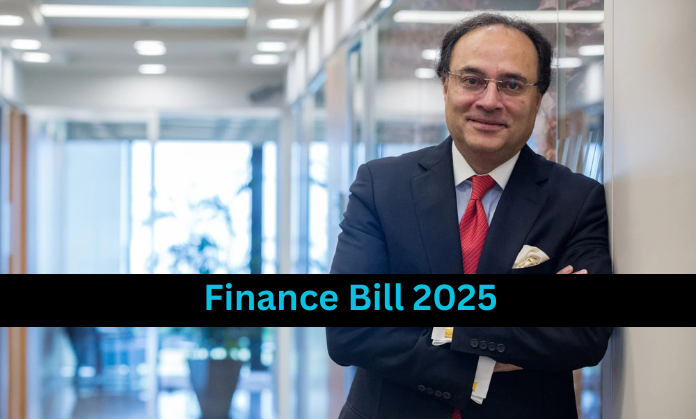Reporters Walk Out Over Lack of Briefing
A press conference on the Finance Bill 2025 turned tense when reporters walked out in protest over not being given a technical briefing by the Federal Board of Revenue (FBR). According to a Dawn.com correspondent, journalists expressed serious concerns about the lack of clarity and transparency in the proposed budget measures.
Despite the walkout, Finance Minister Muhammad Aurangzeb, flanked by FBR Chairman Rashid Mahmood Langrial and Finance Secretary Imdadullah Bosal, continued with the briefing in the presence of some media personnel.
Tariff Reforms to Boost Exports
Aurangzeb highlighted major tariff reforms under the National Tariff Policy, designed to support export-led growth. He clarified that additional customs duties were removed on four lines and reduced on 2,700 tariff lines. These changes directly affect raw materials crucial to the export industry.
“People ask whether revenue will decline. But if we want to move forward with an export-led approach, such steps are necessary,” Aurangzeb stated.
The finance minister also emphasized that these changes apply to the upcoming year only and that further reforms will follow.
Corporate Sector Relief and Real Estate Measures
To support business activity, the super tax on the corporate sector has been reduced by 0.5%. Discussing real estate, Aurangzeb explained that while capital gains tax remains on the selling side, relief is planned for property buyers, signaling a more balanced policy.
He also stressed the importance of mortgage financing, calling it as critical as tax reforms for long-term fiscal planning.
No Additional Tax on Agricultural Inputs
A proposed additional tax on fertilizers and pesticides was withdrawn after discussions with the International Monetary Fund (IMF) and on directions from Prime Minister Shehbaz Sharif. The government argued these inputs are essential for agriculture and should not be taxed.
“This is a step in the right direction,” said the finance minister.
Enforcement Over New Taxes
Aurangzeb admitted that in previous years, additional taxes were imposed due to pressure from international lenders who doubted Pakistan’s enforcement capabilities. This year, however, the government focused more on tax enforcement, resulting in over Rs400 billion in recovered revenue.
He stated the government is aiming for a tax-to-GDP ratio of 10.9% next year. Out of the Rs2.2 trillion revenue target, Rs312 billion will come from new tax measures. However, much of the effort will rely on parliamentary amendments to strengthen enforcement laws.
Focus on Agriculture and Small Farmers
The finance minister also called for reducing the role of middlemen in agriculture and increasing financing for small farmers. He said agriculture remains a devolved subject, but federal policies must still ensure support for rural development.
Benchmarking Salaries and Pensions with Inflation
On the topic of government salaries and pensions, Aurangzeb noted the importance of benchmarking these figures with the inflation rate.
“If inflation is falling, salaries and pensions should also align. This is standard practice globally,” he said.
Government Spending and Debt Control
Acknowledging public concerns about high government expenditures, Aurangzeb revealed that spending increased by only 1.9% in the outgoing fiscal year. The government cut subsidies and debt-servicing costs, although some areas saw increases due to national needs.
He stressed that since Pakistan starts each fiscal year with a deficit, most expenses are funded through loans. He warned that without better spending controls, public debt will continue to rise.
Trump and Elon Musk: Exploring Their Relationship and Impact
Federal Budget 2025-26: Major Announcements
While maintaining an aggressive stance on fiscal consolidation under IMF guidance, the federal budget for FY 2025-26 still provided some relief for the salaried class and introduced incentives for real estate and construction sectors to stimulate growth.
Key new taxes and levies include:
-
Carbon levy of Rs2.5 per litre on petrol, diesel, and furnace oil (to double next year)
-
5% tax on large pensions
-
18% tax on imported solar panels
-
Higher debt servicing surcharge on electricity
-
Gradual removal of tax exemptions for tribal areas
Finance Bill 2025 introduces major tariff reforms to boost Pakistan’s export sector and reduce import costs.
The government’s Finance Bill 2025 focuses on fiscal discipline, enforcement, and relief for the salaried and business sectors.
With the Finance Bill 2025, Pakistan aims to increase its tax-to-GDP ratio while supporting economic growth through targeted incentives.
Property buyers, exporters, and the corporate sector will see changes under the new Finance Bill 2025.
The Finance Bill 2025 includes a carbon levy, tax on pensions, and new duties to meet IMF requirements.
Relief for agriculture and real estate are among the highlights of Pakistan’s Finance Bill 2025.
Enforcement-based tax recovery is a key pillar of the Finance Bill 2025, bringing in over Rs400 billion.
The Finance Bill 2025 marks a strategic shift towards sustainable revenue generation and reduced government borrowing.
Pakistan’s Finance Bill 2025 reflects a balance between economic stability and social responsibility.
The implementation of the Finance Bill 2025 will be critical in shaping Pakistan’s fiscal future and investor confidence.




